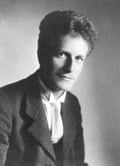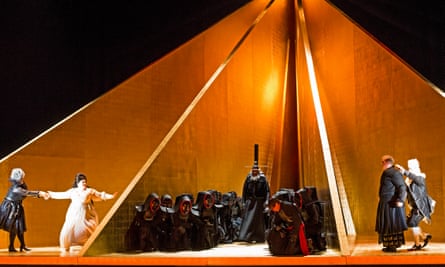Frank Martin’s opera about Tristan and Iseult - the tragic couple of Celtic legend whose love for each other is awakened when they drink a potion – is, in many respects, the polar opposite of Wagner’s celebrated version of the same myth. Wagner’s work is famous for being one of the most influential and ground-breaking operas of all time. His five-hour, opulent extravaganza exalts erotic love to a transcendental, epic level, and extensively explores the metaphysics of love. Commanding the forces of super human singers and an enormous orchestra, it is a huge undertaking for any opera company.
Swiss composer Frank Martin was born in 1890 – 25 years after the première of Wagner’s Tristan. His treatment of the medieval legend is for eight instruments and 12 singers, written between 1938 and 1941. Though he admitted to being influenced by the German composer (and you can hear echoes of Wagner’s Tristan quoted at moments in Le Vin herbé), it was Bach, not Wagner, whom he described as his greatest artistic influence “yesterday, today, forever”.

Le Vin herbé does feel very close to the oratorios that Bach composed, and was described by the composer himself as a “secular oratorio”. Indeed, in traditional oratorio fashion, the story of the lovers is more narrated than dramatised, and Martin himself was resistant to the idea of theatricalising his composition, which he had intended to be performed as a concert.
And yet, the more one examines Le Vin herbé, the more it reveals itself as a work of instinctive theatricality. The very first thing the singers do is acknowledge the presence of their audience. “My Lords, will it please you to hear, a great story of love and death?” they ask, in the prologue. Contained within this narration, are psychologically vivid, “close-up” moments of the mythical protagonists’ experience.

Equal to the drama of this famous, fated romance, is the drama of a collective engaging with this myth: this is the story of people telling the story of Tristan and Iseult. Through their direct address, Martin’s chorus simultaneously both distances and draws in the audience. This layered, ritualistic approach to the presentation of this story assumes the meeting of three distinct plains of reality: the world of the mythical protagonists, the world of the storytellers, and the world of the audience. As the dramaturgy shifts between these three plains of reality; the unique theatrical leverage of Martin’s piece grows.
In our new production for Welsh National Opera we’ve expanded Martin’s original 12 singers to an ensemble of 40 and – in whole or in part – the chorus are our narrators. All the performers are on stage throughout; it is essentially their belief and imaginative investment in the story that gives the drama life. Also onstage, indeed centre stage, are the chamber ensemble and conductor, James Southall, which allows the musicians to also become part of the storytelling process and puts Martin’s most unique musical idiom at the centre of our dramatic world.

Martin’s narrators tell this story in 22 short, discrete tableaux. They set the scene for the audience and then give the protagonists the stage, for as long as is necessary to reveal the psychology behind the development of the plot. The longest tableau is Tristan’s breakdown, at the very centre of the piece. It’s a ten-minute monologue in which Tristan tears himself apart with guilt at having betrayed his uncle King Mark. He decides, that despite his love for Iseult, he must “return her to the King” as she is his lawful wife. But even this intensely psychological exploration is framed, and therefore controlled, by the narrators. In rehearsals with Tom Randle and Caitlin Hulcup – who play our Tristan and Iseult – we have discussed the power of stepping into these intense moments, and then also stepping away from them, rather than trying to sustain, for example, Tristan’s mythical sadness for the entirety of the show.
In response to Martin’s pared back, austere sound world, we have set the action in the empty shell of the theatre, where nothing is masked. The lighting bars, fire exits, props tables and stage management are all revealed making this, essentially, a site-specific show in an empty theatre. In rehearsals we have been exploring the effects of starting with an empty stage (like David Byrne in the Stop Making Sense Talking Heads movie) and building towards the world of the mythical progressively. Unlike Wagner’s maximalist, ultra Romantic and overtly theatrical operation, the trance-like, mesmeric effect of Martin’s music, is, like the love potion, a rare kind of intoxication, which leads us towards the mythical.
Welsh National Opera’s new production of Le Vin herbé, directed by Polly Graham, opens at Wales Millennium Centre, Cardiff on 16 February before touring.
